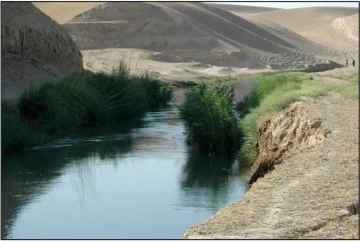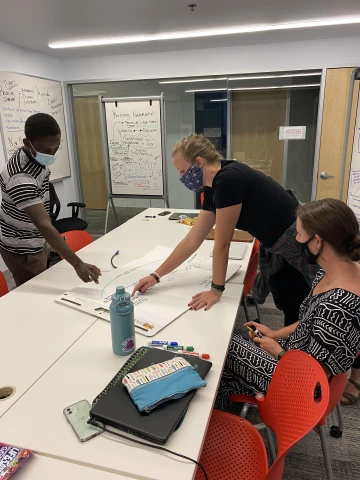Faculty Feature: Dr. Corrie Hannah

Dr. Corrie Hannah, a research scientist at the University of Arizona’s Arizona Institute for Resilience, is committed to finding solutions to social and environmental challenges prevalent in marginalized communities with limited resources.
Her research has taken her around the world, but Dr. Hannah’s work here in Tucson could have an even broader reach. In addition to exploring disaster risk reduction and humanitarian aid, she is also expanding the resources available to historically underfunded scholars tackling climate adaptation research throughout Africa.
Dr. Hannah’s current research project seeks to understand how disaster risk reduction policies and humanitarian assistance programs transform institutional systems and human behaviors. Recently, her endeavors have centered on examining the governance of semi-arid and smallholder irrigation systems in Tajikistan and Kenya, as well as delving into urban food systems and security in Kenya and Zambia.

Canals in Tajikistan
Ultimately, she hopes to help foster equitable adaptation and resilience among individuals, households, and communities faced with climate-induced disasters.
Throughout her journey in these areas of study, Dr. Hannah has come to recognize the paramount importance of locally driven, grassroots initiatives, including climate adaptation research led by communities themselves.
“These initiatives play a vital role in ensuring effective long-term preparation and response to climate disasters,” Dr. Hannah said.
However, there has been a severe lack of funding allocated to scholars in regions of the world that are most vulnerable to climate-induced disasters, such as Africa, Latin America and the Caribbean, and the Pacific Islands.
“Scholars from these regions possess tremendous potential to contribute to climate adaptation research and shape climate agendas within their own countries,” she said. “Unfortunately, they encounter numerous barriers, including limited funding opportunities, insufficient research training, and limited avenues to contribute to existing climate change.”
In response to these disparities, Dr. Hannah is spearheading a collaborative effort known as the Climate Adaptation Research Program (CARP), which aims to facilitate a new generation of localized climate change adaptation research primarily among early-career university researchers and postgraduate students in the global south.

CARP seeks to inform strategies and solutions for humanitarian assistance and disaster risk reduction by harnessing the research capacities of universities in the global south and fostering engagement with key stakeholders who rely on climate adaptation knowledge.
In collaboration with Humanitarian Assistance Technical Support at the University of Arizona and the Centre for Collaboration in Africa at Stellenbosch University, CARP secures research grants and provides training to researchers affiliated with the Partners for Enhancing Resilience of People Exposed to Risks network. This network comprises 12 universities across Africa and receives funding from the USAID's Bureau for Humanitarian Assistance.
Recently, Dr. Corrie Hannah and her team selected a cohort of African researchers who will participate in the CARP program. This cohort consists of over 30 applied projects encompassing various topics, including early warning systems, disaster monitoring, extreme heat, drought mitigation, flooding, urban planning, public health, vulnerability assessment, and more. Dr. Hannah and her team are eager to collaborate with these researchers throughout the next 18 months and are excited about the potential impact their work will have.
